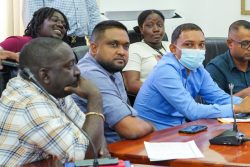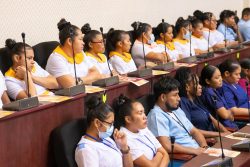By April of 1974, the US Embassy here was reporting back to Washington that fundamental rights were being eroded and journalists were being intimated.
In a cable dated April 10, 1974, US Ambassador Max V Krebs in response to a question said that there were no instances of internment or imprisonment for political reasons but that the country’s political system was “evolving in (an) authoritarian direction and fundamental rights established in Chapter Two of the constitution are being eroded”.
The cable said that the government “limits itself to intimidation and harassment of its critics. Several journalists who criticized GoG have been forced to leave their newspapers, and government had enacted legislation permitting preventive detention”.
The cable added that the most recent and potentially explosive case of such tactics was the charging of the leader of a small opposition party, Dr Ganraj Kumar with seditious libel. The cable noted that Kumar if convicted could face a possible prison term.
“However, image conscious GoG appears to be aware of significance of jailing Kumar and is (proceeding) slowly and cautiously with preliminary judicial inquiry”, the cable said. Kumar was acquitted of the charge in 1977.
The cable went on to say that in the hypothetical case that political prisoners are held in Guyana, a US Government threat to deny economic assistance to the country would be seen by the government here as “unjustifiable intervention in domestic affairs”. It added that such a development would also complicate the position of any prisoner by making him seem to be an agent of a foreign power.








